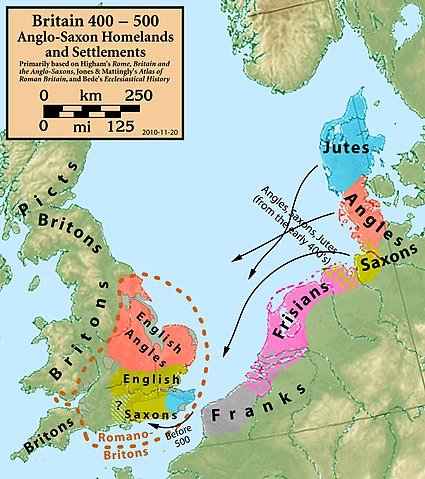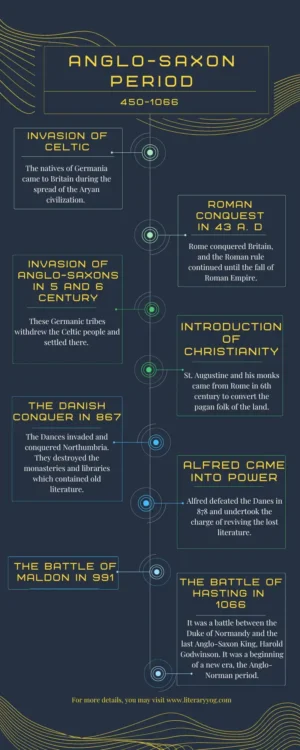Learn about Anglo-Saxon Period in Simplest Explanation
In this first post of the series on the history of English literature, I will focus on the history of Anglo-Saxon and its people. The following blog post will dedicate to old English literature only.
Characteristics of the Age
The Anglo-Saxon period started in 450 and ended with the Norman invasion in 1066. We can condense the period into the following characteristics:
It is an age of invasion. Many tribes invaded Britain during the period. It started with a territorial raid of the Celtic and ended with the Norman Conquest. It is also an age of Roman cultural invasion.
The life that these tribes followed was a life of barbarity. They were hunters, food gathers, and had a warrior spirit.
The age is also remarking for the introduction of Christianity. The people of Anglo-Saxon follow paganism. Later, under the influence of missionary missions, they converted to Christianity.
Along with Christianity, the Romans introduced Latin to the English people.
The people of England are mixed with different races: Celtic, German, Roman, Viking, etc.
Anglo-Saxon Period
The First Inhabitants
A primitive race, the Paleolithic, was the first race in Britain. After them, another group of men of the Neolithic age who were dark, curly-haired, dwarfs succeeded them. They lived in the land until the first Celtic invasion.
The Celtic or the Gaels invaded the land first. According to the Roman historian Tacitus, Celtic people came from Germany to live in Britain in the 4th century.
The Celtic or the Brythorns settled in the land when the Aryan people spread in the West. They settled to the southwest and west. The Celtic natives were later known as the Cymri or the Welsh.
In the fifth century, Rome invaded Britain and colonized the land. The Romans ruled for a long time. However, they did not remain there after the fall of the Roman empire. The Roman army left Britain and made it vulnerable to invasion.
Anglo-Saxon invasion
Anglo-Saxons refer to the groups of three Germanic tribes: Angles, Saxons, and Jutes. They invaded old Britain in the fifth and sixth centuries. The Anglo and Saxons come from the places Angeln and Saxony respectively.

They led a bucolic life on the shores of the Baltic and North Seas. However, if they got a chance to loot, they never stepped back. Moreover, these Germanic tribes had an adventurous spirit. The piratical expeditions and their love of exploring new places made them invade Britain.
The People
These tribes were fearsome and powerful. Contrarily, the Celtic inhabitants were weak to resist the invasion. Consequently, they had to move to the regions of Wales, Cornwall, and the highlands of Scotland.
These Germanic tribes were farmers, hunters, and sea rovers. Out of these tribes, the Angles were the largest dominant tribe. After their invasion, they became permanent settlers of the land.
They might be savage and looters, but they had an emotional side that defined them.
They loved the sea and had a keen relationship with her. This adoration finds its finest expression in poems like The Seafarer and Beowulf. We can read The Seafarer not only as a monologue of a seaman but also as an allegory of human life. In Beowulf, we find the poet addressing the sea under different names such as holm, brim, the swan road, etc.
They also loved freedom more than anything. Their individualism was marked by their choice to live in small communities. The houses in the villages were separated from one another.
They were brave and valor had a high position in their communities. Therefore, they often committed infanticide. For them, the weak had no position and respect among their relatives. We find their expression of gallantry in the poem Beowulf.
The heroic poem Beowulf is a depiction of heroism. Beowulf fights thrice: first with the monster Grendel, next with the mother of Grendel, and his last fight with a dragon.
More than the fighting, the poem is one of the finest early English poems because of its projection of the ideal man’s life. It is about a hero who goes to fight with a monster to protect his people and later sacrificed his life for his people.
Interestingly, women in this period had more freedom than women in other eras. Society granted them the rights of property and judicial proceedings to them. They also allowed them to participate in meetings where regional politics was a subject of discussion.
The life of these tribes and their ideals find their expression in old English literature. The literature of the tribes was mainly a body of oral literature. It was passed orally from mouth to mouth, from one generation to the next.
After their settlement, some anonymous poets wrote a few literary works. Therefore, we can assume that the root of English literature originated in Germany.
The name Anglalond is derived from them. Later, as a result of language change, Anglalond became Englelond and then England.
The word English is derived from their word Englisc.
Introduction of Christianity
Though Romans left before the invasion of Anglo Saxons, they reentered the land with Roman Christianity in the late sixth century. These tribal people were pagans and under the influence of missionaries, they converted these tribal people to Christianity by the end of the seventh century.
It was a cultural colonization of Rome with the introduction of Christianity. These missionary priests brought Christianity to England. Pope Gregory the Great appointed a group of Benedictines to England to propagate Roman Christianity in AD 596.
Saint Augustine, the first Archbishop of Canterbury, led the missionary mission. It is the Canterbury where pilgrims in Chaucer’s The Canterbury Tales go. The missionaries built monasteries and churches and introduced religious texts to non-Christians.
Moreover, the oral literature of the Anglo-Saxons found a new form in the hands of Christian clerks. The Romans brought Latin to England, and there was a transformation in the language. The Roman letters replaced the old runic alphabets of the tribes. In the monasteries and cathedral schools, the Romans made Latin a medium of teaching and learning.
That is probably the reason why Bede wrote The Ecclesiastical History of the English People in Latin.
During that time, Northumbria became a center of intellectual growth. The Irish missionaries came to Northumbria and promoted scholarship and Latin.
However, the monasteries did not last long. The Viking sea raiders destroyed the abbey, libraries, and monastic schools at Lindisfarne and Jarrow in 793 and 794. Four important surviving manuscripts poems out of ruined literature are also known as Junius Manuscript. These are the Beowulf manuscript, the Vercelli Book, and the Exeter Book.
We will discuss them in detail in the next blog post on Old English Literature.
Alfred the Great
The period of Anglo-Saxon would be incomplete without mentioning Alfred, the King of Wessex. He united the people not only politically, but also culturally.
The Danes conquered Northumbria in 867. Alfred defeated them and became the king of Wessex in 878. After becoming king, he felt his people needed education, and the problem he encountered was there were no English-translated texts for instruction.
Alfred reemphasized the learning of English during his reign. Therefore, he himself learned Latin and translated the Latin texts into English.
Most of the population was not adept in Latin. Therefore, the religious clerks used English instead of Latin for religious instructions like sermons. The monastery of Wessex brought educational reforms in the late tenth century and focused more on vernacular English. There was a revival of monasteries under the guidance of the three archbishops in the tenth century.
He also promoted scholarship and tried to preserve the lost literature of Northumbria. He engaged every poor scholar at either work or teaching and rewarded those who brought fragments of manuscripts of monasteries of Northumbria. In this way, he saved a set of literature under his guidance.
Summary
In conclusion, the summary of the period is noted down in bullet points below:
- The Celtic from Germania invaded England.
- Extension of Roman Empire up to Britain and their fall.
- Invasion of Anglo-Saxons.
- Introduction of Christianity and Latin.
- A body of Christian literature developed between 650 and 850.
- Danes conquered Northumbria and destroyed the monasteries and libraries.
- Rescue of literature of Northumbria.

References
- A History of English literature. by Arthur Compton-Rickett.
- English Literature by William J Long.
- Some Aspects Of The History Of English Literature By Kalyannath Dutta.
- The Short Oxford History of English Literature by Andrew Sanders.